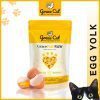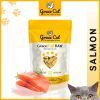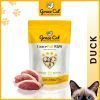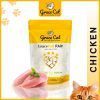Best Diet For Cats: Healthy & Nutritious Food for Your Cats
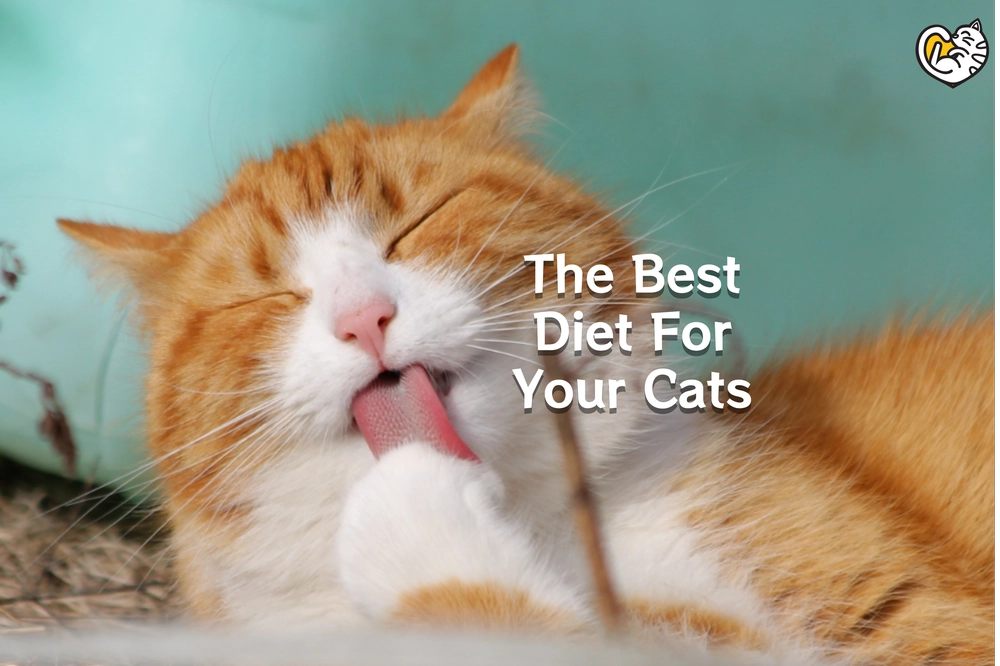

If you are looking for the best diet for cats or healthy food for cats, be proud of yourself as you are a responsible cat lover. Ensuring your feline companion maintains a happy and healthy life hinges on a nutritious and balanced diet. Here are well-researched and proven tips to ensure your cat receives the essential nutrients it requires.
Is Your Cat Picky About Food?
Well, my cats used to be like that too, but now they finished the food all the time!
If your cat doesn’t want to eat the food or finish the food you gave, I have a solution for you. Read my true story here.
What's the Best Diet for Your Cats
Maintaining the well-being of our cats not only enhances their overall happiness but also contributes to longer, more satisfying lives filled with cuddles and playtime. As proud pet parents, ensuring our cats receive a healthy and nutritional-balanced diet is a crucial aspect of their health.
Nutrition plays a pivotal role in the overall health and wellness of our pets, fueling every aspect of their bodies and lives. It is instrumental in maintaining a healthy weight and providing essential nourishment while avoiding potentially harmful or toxic foods.
In understanding a key cat fact, it becomes apparent that cat diets are highly specific. Cats are classified as "obligate carnivores," indicating their need for substantial amounts of meat to nourish their bodies and promote longevity.
To guide you through the realm of feline nutrition, we have done a thorough research and consulted experts to outline the optimal cat diet, addressing common queries such as what is the healthy food for cats and the best diet for cats. Prioritizing your furry feline friend's health is a gesture they'll surely appreciate.
Select Cat Food Tailored to Your Cat’s Stage in Life
Age is a critical factor when considering your cat's diet. Distinct life stages come with varying activity levels and nutritional requirements.
Kittens, for instance, are typically more active than their senior counterparts and necessitate additional nutrition to support their rapid growth. It's crucial to provide balanced food specifically designed for kittens until they reach adulthood.
Senior cats, on the other hand, have unique nutritional needs. Mature kitties often require increased protein to address muscle loss and support their renal systems. Simultaneously, they benefit from foods lower in fat and calories to prevent unwanted weight gain.
Tailoring the diet to your cat's specific life stage ensures they receive the optimal nutrients for their age and health requirements.
Incorporate Meat-based Protein in Cat's Diet
It's crucial to recognize that your beloved feline friend requires meat protein as an integral part of their diet. Cats, as obligate carnivores, rely on specific amino acids and nutrients that they cannot produce on their own.
Therefore, the majority of their diet should consist of meat, poultry, or fish to fulfill these essential nutritional requirements. Optimal cat food prioritizes appropriate levels of these nutrients to ensure the well-being of your cat.
Avoid High Amounts of Grain in Cat Food
Cats don't require substantial amounts of grain for optimal health, so it's advisable to steer clear of foods where grain is a primary ingredient.
Grains often serve as inexpensive "fillers," providing more volume for less cost but may lack essential nutrition. It's crucial to avoid fillers—ingredients with no nutritional purpose. Grains, including carbohydrates, should only play a minor role as an energy source in a cat's diet.
An excess of grains in a cat's diet can potentially lead to malnutrition, obesity, organ-related issues, and gastrointestinal tract problems. Opting for cat food that prioritizes essential nutrients over excessive fillers is key to supporting your cat's overall well-being.
Consider Wet Food Over Dry
Quality takes precedence when deciding what to feed cats, and many veterinarians advocate for nutritionally balanced wet food as the superior option over dry kibble.
Cats, being naturally desert animals, lack the same inclination as dogs to drink water regularly. This tendency can result in chronic under-hydration, making wet food an excellent choice to provide additional hydration for your cat.
However, it's important to be mindful that not all wet food is of high quality, so reading labels remains crucial. Additionally, wet food necessitates more diligent cleaning of the cat bowl, as it can harbor bacteria and pose a risk to your cat's health.
Another viable alternative is to feed high-quality freeze-dried cat food with added water, offering the benefits of both high-quality nutrition and adequate water intake.
Consider Any Health Conditions of Your Cats
Beyond selecting food based on your cat's life stages, it's crucial to take into account any potential ailments or sensitivities that may arise over time.
For instance, mother cats nursing their kittens require a significantly higher caloric diet to meet the demands of lactation. Some cats may require simpler diets due to allergies or sensitivities.
Consulting with your veterinarian is essential to navigate these specific dietary needs and ensure your cat receives the appropriate nutrition tailored to their individual health considerations.
Opt for Meal-feeding Versus Free-Feeding
Simply pouring food into your kitty's bowl and considering it a day may seem like the convenient approach, especially for weekend feeding, but it's worth reconsidering.
While free-feeding is a common practice, I always recommend meal-feeding for cats. This approach can contribute to reducing the risk of obesity, a prevalent health issue among cats.
Meal-feeding is particularly beneficial because wet food should not be left out for extended periods. Ensuring your cat receives measured meals helps manage their weight and promotes overall health. Consider adopting the meal-feeding strategy to support your cat's well-being and mitigate common health concerns.
Beware of Gimmicky Labels on Pet Food
Pet food companies often utilize clever marketing tactics to capture the attention of customers and their wallets. However, it's crucial to be wary of gimmicky labels containing terms like "primitive," "ancestral," "booster," or "wild." These terms are primarily marketing strategies and may not accurately reflect the nutritional quality of the cat food.
Rather than being swayed by flashy words, pet parents should scrutinize a food's label to assess its actual suitability. Examining the ingredients list and nutritional information provides a more accurate understanding of whether a particular cat food is a suitable and beneficial option for your feline companion.
Follow On-label Feeding Instructions
While a chunky cat may be adorable, it's essential to recognize that excess weight can have long-term consequences on their health. Therefore, ensuring you feed your cat the right amount of calories each day is crucial. Meal-feeding is a helpful strategy in managing this, but it's equally important to pay attention to the on-label feeding instructions provided by the cat food.
The recommended amount of food mentioned on the packaging is typically formulated with the guidance of veterinary nutritionists. These professionals carefully design each product, and adhering to the package instructions is vital not only for maintaining a healthy weight but also for the overall safety and well-being of your cat. Following these instructions ensures your cat receives the appropriate nutrition tailored to their current weight.
Don’t Go Overboard With Treats
Cat treats serve various purposes, from training to administering medication or celebrating your cat's achievements. However, it's crucial to be mindful of their calorie content, and as a general guideline, treats should constitute no more than 10% of your pet's diet. Additionally, the manner in which you give treats can be strategic in training or modifying certain behaviors.
Frequent consumption of treats, especially cheap and low-quality cat treats, can disrupt your cat's nutritional balance, potentially affecting their appetite for essential food and even leading to picky eating habits. Therefore, it's important to offer treats sparingly and with purpose to ensure they complement, rather than compromise, your cat's overall diet and health. If possible, go for 100% natural and healthy cat treats such as the Grace Cat GraceFull RAW cat treats.
Offer Human Foods Sparingly (Or Don’t)
As long as your cat's diet primarily consists of nutritionally balanced cat food, you can occasionally supplement with small amounts of tasty fruits and vegetables. Some examples include sweet potato, steamed broccoli, and banana, but it's essential to exercise caution.
Many vegetables are high in carbohydrates, and it's advisable to limit the intake of carbs in your cat's diet. However, certain fruits and vegetables can serve as good treats and provide additional health benefits alongside a primarily protein-based diet. For instance, cooked carrots are rich in vitamins, fiber, and magnesium. Strawberries and pumpkins are also suitable options for cats. Additionally, small pieces of cooked meat or fish can make delightful treats while contributing to a well-rounded diet for your feline friend.
Never Feed Cats Dog Food
The question of whether cats can eat dog food might cross your mind, given their similar appearance. However, the unequivocal answer is no. While an occasional mouthful from the dog's bowl may not be cause for concern, it's crucial to ensure that 90% or more of your cat's diet consists of cat food. Cats have specific dietary requirements, relying heavily on diets abundant in animal-based protein.
Dogs, on the other hand, have distinct nutritional needs, and the best diet for them is formulated to meet those specific requirements. Feeding your cat a diet primarily designed for dogs can lead to nutritional deficiencies and health issues, emphasizing the importance of providing cats with nutritionally balanced cat food.
Make Eating a More Exciting Experience
Cats, being natural hunters, thrive on mentally stimulating activities. While playing with lasers or tossing around cat toys are effective ways to engage their brains, it's worth considering incorporating mental stimulation into their cat diet.
Administering treats through lick mats or food puzzles can be an excellent way to provide your cat with enriching and mentally stimulating activities. This not only adds a layer of engagement to their routine but also taps into their natural instincts, contributing to their overall well-being.
Take It Slow When Transitioning Diets
If you've decided to make changes to your cat's diet, whether to establish new habits or opt for a healthier option, it's crucial to implement the transition gradually. We recommend a 10-day period for the full switch.
Begin with a mixture of 90% of their old food and 10% of the new food, gradually shifting to 100% of the new food over the course of 10 days. This gradual transition helps prevent digestive upset and allows your cat to adapt to the new diet comfortably.
Consult A Cat Food Nutritionist If Needed
Similar to humans, there's no one-size-fits-all solution when it comes to the best cat diet. Different cats may require unique approaches to ensure they're consuming the right amount of calories or receiving specialized diets due to medications.
It's crucial to acknowledge that cats' nutritional needs evolve throughout various life stages. Therefore, periodic reassessment of their diet, ideally with guidance from a cat food nutritionist, is important to ensure that their nutritional requirements are met effectively. This approach allows for adjustments that cater to your cat's specific needs at each stage of their life.
Conclusion: Healthy Food For Cats
In conclusion, providing your feline friend with a healthy and nutritious diet is paramount for their overall well-being and longevity. Recognizing that cats have specific dietary needs, tailored to their life stages and individual health conditions, is essential.
Opting for quality cat food, considering freeze-dried options with added water for hydration, and being mindful of cat treats intake contribute to a balanced and fulfilling diet.
Remember, a thoughtful and well-rounded approach to your cat's diet not only supports their physical health but also enhances their mental stimulation and happiness.
Do you know the biggest challenge faced by cat owners?
It’s not what you think. Find out the answer here (before it’s too late).

